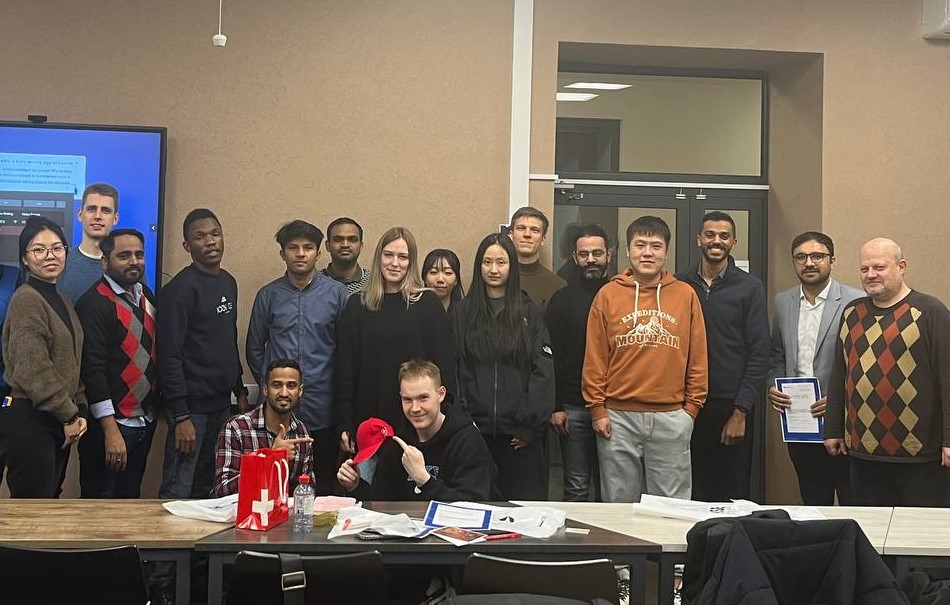‘Cultural Sensitivity Is Important in International Business Communication’
HSE University-Nizhny Novgorod has hosted a workshop on 'Intercultural Communication and Management: Swiss and Russian Views and Perspectives of Academia and Business.’ The workshop was organised by the Swiss Embassy in Russia.

The workshop ‘Intercultural Communication and Management: Swiss and Russian Views and Perspectives of Academia and Business’ is designed to introduce students of the master's programmes ‘Business Development’ and ‘Global Business’ to the specifics of communication in business and science in different countries.
‘In today's globalised world, it is impossible to do business without understanding the cultural characteristics of a particular state—the success of any project depends on it,’ said Denis Fomenkov, Deputy Director of HSE University-Nizhny Novgorod.
Daniel Hermann, business consultant at the Swiss technopark Moba Haus in St Petersburg, introduced students to the specifics of doing business in Switzerland. He has been living in Russia for more than 20 years, which has given him a fine sense of the communication features, key cultural concepts, and values of the country. Comparing well-known phraseological units and popular expressions in Russia and Switzerland, Daniel showed how language reflects national qualities in people's everyday life and behaviour.
Zhao Zilin, invited specialist from the Department of Literature and Intercultural Communication at HSE University in Nizhny Novgorod, immersed the participants in the specifics of communication in the context of Chinese culture.

Zhao Zilin
Chinese people very often use emojis in chats, even in business correspondence. At the same time, emojis familiar to Russians have their own shades of meaning in Chinese culture or mean something completely different. Emoticons denoting emotions can cause misunderstandings instead of simplifying communication. Emoji with gestures are even riskier.
Natalia Ursul, Associate Professor at the Department of Foreign Languages at HSE University-St Petersburg, tested the participants on the meaning of sign language in different countries, noting the importance of non-verbal communication.

Natalia Ursul
International companies are primarily looking for soft skills in potential employees: flexibility, sociability, stress tolerance. The combination of knowledge of language, communication, and culture is an important core competence.
Dmitry Sidorov, Head of the HSE Nizhny Novgorod Centre for Entrepreneurship, outlined the prospects for global startups in a divided world and stressed the importance of acquiring skills and knowledge in the field of intercultural communication.

Dmitry Sidorov
Despite the geopolitical events that have radically changed the venture capital market and created barriers to global business development, there are still opportunities to create interesting startups.
After the plenary sessions, students were asked to solve a case on intercultural communication and management: to present proposals on behalf of consulting firms to transform the corporate culture of a large Russian company that acquired a small but fast-growing Chinese company with subsidiaries in Germany, the UAE, Brazil, and China. The reward for participation was memorable gifts from the Swiss Embassy and HSE University-Nizhny Novgorod.

Ulla Irfan, member of the winning team, student of the Master's programme ‘Business Development’
Solving the case study on the cultures of different countries was a very valuable experience that will undoubtedly help me navigate various cultural scenarios more effectively. Cultural sensitivity is important in international business communication. I highly appreciated the interactive nature of the sessions and the abundance of real-life examples covered by representatives of multinational companies and HSE professors.

Bang Seona, student of the Master's programme ‘Business Development’
I think that the workshop turned out to be very interesting not only because of the participation of experts, the accessibility of the language, and the examples and cases considered, but also because there were students of different nationalities in our group. We were able to share the experience of our native countries in communication in everyday life, business, and science.
Zhao Zilin noted that ‘our intercultural communication continued during the breaks; the participants actively exchanged their experiences and managerial life hacks, and helped each other develop. And the solution of the case allowed us to immediately work on the knowledge gained in practice.’

